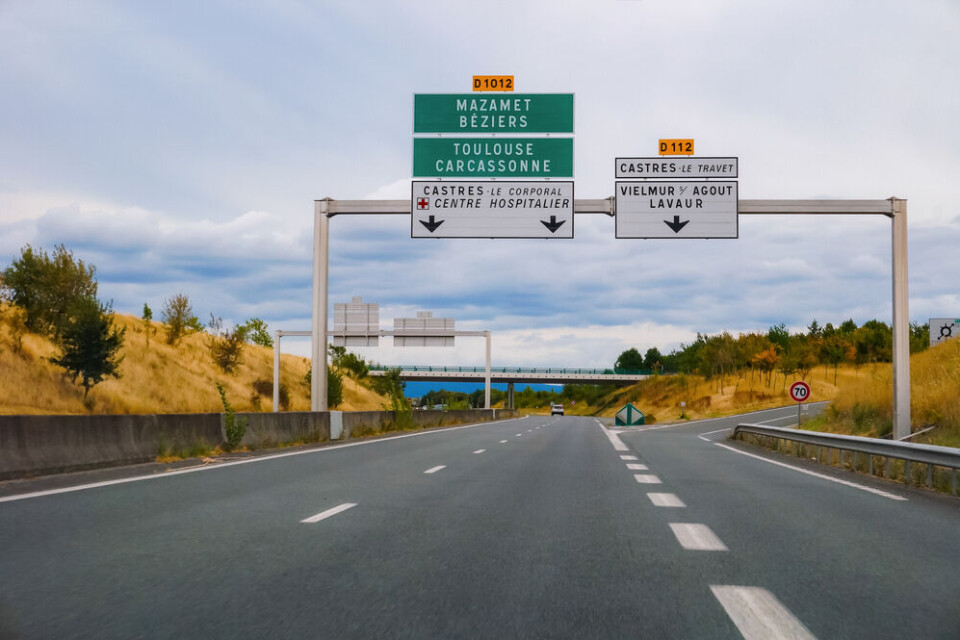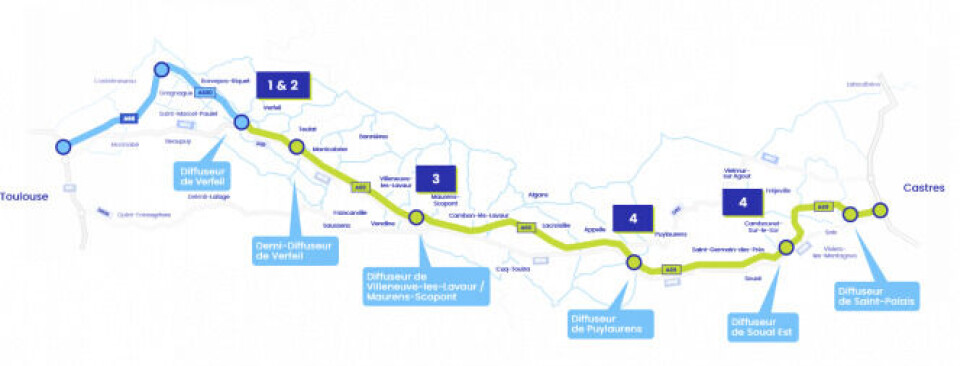-
France to host first NFL regular-season game at Stade de France in 2026
The US’s National American Football League has over 14 million fans in France
-
Storm Leonardo set to impact France in next few days
Heavy rain forecast in the south of the country as storm hits Spain
-
French village creates new ‘no door-to-door sales’ sticker
Authorities have also brought in heavy sanctions for unwanted sales approaches
Greta Thunberg at protest against new motorway in south-west France
The Swedish activist called the project ‘absolute madness’

Swedish climate activist Greta Thunberg has attended a protest over a new motorway in the south-west of France, denouncing the project as “pure madness”.
Ms Thunberg joined protesters in Saïx, Tarn (Occitanie), on Saturday (February 10) in the latest action against the controversial A69 Toulouse-Castres motorway project. She arrived mid-morning, wearing a red coat and a Palestinian keffiyeh around her neck.
Greta Thunberg dans le Tarn « en solidarité avec ceux qui résistent » au projet d’autoroute entre Toulouse et Castres https://t.co/dxjNHjpiay
— Le Monde (@lemondefr) February 10, 2024
The commune of Saïx, west of Castres, was hosting a weekend to raise awareness about the motorway project.
“We are here because we are against this project,” said Ms Thunberg, speaking in English. “We are here to show our support and solidarity to those activists who are resisting this project, who are defending nature and the land…
“It is absolute madness that this is going ahead, and that we continue to throw people under the bus, and that we continue to waste resources on something that will both destroy nature and lock us further into this destructive system.”
She then added, in French: “Stop A69!”
🗣 "C'est une folie que ce projet soit maintenu"
— BFM (@BFMTV) February 10, 2024
➡ L'activiste écologiste suédoise Greta Thunberg est aux côtés des militants anti-A69 dans le Tarn pic.twitter.com/Uh4WUDpIrW
Police unable to enter ‘ZAD’ area
Police at the protest used tear gas to dispel the crowds.
However, they were unable to enter the ‘ZAD’, which stands for zone à défendre (area to defend). The area is on private land (limiting police powers there), and is made up of tree houses where protesters are living in order to prevent construction work.
The ZAD is located beyond a field and a railway line, close to the planned motorway route. Activists remained in the ZAD, with many using tennis rackets to launch projectiles at the police. Ms Thunberg remained with them all afternoon.
She had reportedly been invited to the protest by activists from the association La Voie est Libre. Group member Amine Messal, 25, said: “We don’t have time to wait for our generation to take over [before we take action on the environment].”
One of the organising groups, No Macadam, said that Ms Thunberg’s presence added legitimacy to the campaign, and “puts the fight against the A69 squarely on the international and national agenda, and urges politicians to reflect on their own stubbornness”.
‘Risk of disturbances to public order’
In a statement, the Tarn prefecture said: “Around a hundred people blocked the railway line between Toulouse and Castres, and put obstacles on it. The individuals had set up three barricades and set one of them on fire. The gendarmes managed to reopen the road that had been blocked.”
As the ZAD is on private land, authorities do not have the power to remove protesters.
The prefecture had told the AFP on Friday (February 9) that public demonstrations and gatherings had been banned due to “the risk of major disturbances to public order”, but conceded that “gatherings on private property, with the owner's agreement, are not prohibited”.
In response to Ms Thunberg’s presence at the protest, on Friday the president of the Tarn departmental council, Christophe Ramond, said: “Dear Greta Thunberg (...) the A69 motorway meets a vital need for the Tarn and its inhabitants.”
What is the A69 motorway plan?
It is a government plan, with concession holder Atosca, to build a new motorway parallel to the current Route nationale. It will cut through 300-400 hectares of farmland, and reduce drivers’ journeys from Castres to Toulouse by 25-35 minutes.
It is due to open in 2025.

Picture credit: Screenshot / a69-atosca.fr/la69/
Why is the A69 plan controversial?
The road has required a considerable amount of forest land to be cleared, 95% of which has already been cut, according to the concession holder Atosca.
Proponents say that the area needs the motorway to improve its links to Toulouse, which will bring considerable economic benefits to an area that would otherwise - they say - be relatively isolated.
Atosca states that the project will create 1,000 direct and indirect jobs. It also claims that the work is being done with respect for the environment, that it will make journeys safer, reduce traffic in central urban areas, and cut pollution in towns.
Read more: Violence fears ahead of protests over new motorway in southern France
Read more: Legal bid launched to put brakes on controversial new French motorway
It says that the construction and final project will respect environmental rules on water, biodiversity, noise pollution, and air quality.
But critics say the project will be disastrous for local wildlife, and has already razed trees and woodland. They also dispute the argument that the Castres-Mazamet area is isolated.
The project was declared a project of ‘public utility’ in 2018 but has since been the subject of more than 500 public meetings. It has been planned for 25 years.
In October 2023, the then-Transport Minister asserted that “the majority” of locals are in favour of the plan. However, there are some notable exceptions.
One mayor, Sabine Mousson of Teulat (Tarn), said: “I don’t want people to explain the work to me anymore, I want people to listen to me. I’ve been fighting against this project for 10 years.”
Lawyer for La Voie est Libre, Alice Terrasse, has previously said that campaigners are prepared to “fight” for years to come “until the project is definitively abandoned.”
Related articles
Controversial new A69 motorway in southern France: What do you think?
MAP: See where in France motorways are currently planned
Controversial new motorway project resumes in southwest France
























